You’ve heard the horror stories from friends about their first period, or maybe you even had your own first period experience that you’ll never forget. I remember hearing one story about a girl whose mother never talked to her about what to expect the first time; when she got her period, she thought there was something really wrong with her. She tried to hide it, while being so frightened for her health at the same time.
Sadly, her story isn’t unique. For many of us, we receive the message that our fertility is something to be ashamed of, a nuisance at best and therefore something worth trying to stifle, often through hormonal birth control. Negative messaging or experiences with periods and fertility certainly aren’t limited to the onset of menstruation. If we experience particularly heavy or painful periods or other reproductive issues, that “time of the month” may seem to stand between us and our ability to achieve personal or professional goals or simply to “live normally.”
As the years go by, painful or traumatic experiences related to our cycles, pregnancy, labor and birth, miscarriage, or other fertility issues may all add up to very complicated or downright negative relationships with our bodies and our fertility. Those experiences may then be compounded by guilt for not sharing the excitement of a family member or friend when it comes to pregnancy in particular, or having more children in general. Talk about a recipe for a difficult relationship with your body and fertility (and other women)!
Beginning (or continuing) on a healing journey is certainly worthwhile, but it may not be easy. Healing a negative relationship with your own body, especially your fertility, becomes even more challenging if you are a mother who is also trying to help her daughter develop a healthy relationship with her body, especially her fertility. In fact, you might feel even more pressure to help your daughter develop a healthy relationship because of your own difficult experiences. How exactly do you go about setting a healthy example for your daughter when you are just starting to, or still working through, your own experience?
First, know that working through trauma or past negative experiences to find healing is not only an important form of authentic self-care. It is also a way to model for your daughter how to face fertility-related challenges, so that she can learn by your example. This is similar to the instruction you hear before any airplane flight, to put on your own oxygen mask before you help those around you. Doing so is important not only because it allows you to freely help others, but also because the act of putting on the mask shows others: ‘Do this.’ When your daughter sees you addressing your own past and perspectives, she understands: ‘When something negative happens, I acknowledge it and take steps to address it, rather than shaming myself, stuffing my feelings, avoiding dealing with the situation, or self-medicating.’
Know that she doesn’t need you to be perfect
One of my favorite theories to share with my psychotherapy clients who are mothers is John Bowlby’s theory of the “good enough” mother. Bowlby was one of the researchers who formulated attachment theory, which describes how our relationship with our primary caregiver as infants and children is formative in how we operate in relationships as adults. His theory of the “good enough” mother was based on his observations of children and mothers when he was studying attachment styles. He found that a secure attachment was formed not because mothers perfectly met their child’s physical and emotional needs, but rather because mothers met their child’s physical and emotional needs most of the time while also repairing any mistakes that were made. The theory of the “good enough” mother is that if you focus on cultivating an attitude of attunement towards your child and their needs instead of pressuring yourself to be the perfect mother, you will help your child develop a secure attachment.
This theory is particularly helpful to keep in mind as you try to work through your own negative or traumatic fertility-related experiences. It’s not about going through the healing process perfectly (whatever that means). It’s about modeling to your daughter the courage to face these experiences head on and do the hard work of healing. While it can be tempting to pretend that you have it all figured out for your daughter’s sake, you don’t have to (nor should you!). In fact, it is probably more valuable and meaningful if you let her know that it’s okay to not have it all figured out.
In age-appropriate ways, perhaps you share bits and pieces of your experience with her, and, when relevant, what you know now that you wish you’d known then. Maybe you let her know that you experienced a miscarriage years before, and now you recognize the importance of carrying that burden together with your spouse, rather than all alone as you did at the time. Maybe you tell her more generally that a couple, not just the woman, shares responsibility for their fertility, even if for years you took birth control or used fertility awareness and did all the charting yourself, and your partner or spouse just went along to get along.
Don’t just talk the talk: Take concrete steps toward healing
It’s also important to have a concrete plan for healing from your negative or traumatic experience, meaning that you take action rather than just endlessly ruminating on or only talking about doing something to address your negative perceptions or experiences. In my work as a mental health therapist, I’ve been privileged to work with many clients who’ve been able to find healing from their pregnancy loss, infertility issues, and traumatic birth experiences. While many of them may not have initially been able to put their finger on exactly what wasn’t right about their experience, they had a gut instinct and started therapy to follow that hunch. One of the themes amongst my female clients is a tendency to minimize the impact of what they’ve gone through. Therapy helps them acknowledge the magnitude of their experience and subsequently heal from it.
I’ve had several clients who said that they felt like they were making too big of a deal out of their negative birth experience because their baby was healthy and they felt guilty for even being troubled by some thing or things that happened during it. Through their work in therapy, they were able to process and heal from the more painful aspects of their childbirth experience instead of trying to tell themselves “this or that shouldn’t bother me.” Trying to shame ourselves into negating our experiences never works. And yes, it does take courage to face those experiences. Setting up an appointment with a counselor can be a great first major step in the healing process.
Where your daughter is concerned, taking concrete action to prevent negative experiences or address current problems can start with speaking positively about her body from the time she is little. As she approaches puberty, you can sign her up for a class to learn to chart her cycle. If she has a phone, and after she’s learned to chart from a trained instructor, connect her with fertility awareness-friendly apps that teach her more about her body and her fertility on an ongoing basis. Encourage her to try out different period products such as menstrual cups or period underwear if conventional tampons or pads are uncomfortable or bulky. If she experiences irregular cycles (beyond the expected timeframe of irregularity for adolescents) or heavy bleeding, she may need you to steer her towards a NaPro, Neo Fertility, or FEMM-trained healthcare provider who can help her get to the root cause of the issue, and take steps to correct it.
Keep in mind that your daughter hears your self-talk
It is also important to model compassion and true empathy to your daughter through the way you talk about your own body and your own experiences with fertility, and through how you talk to her about her experiences. The language you use is very important. Many of my clients have shared how a passing statement from their mother or grandmother or even a more casual acquaintance about the younger woman’s weight, appearance, pregnancy, or childbirth stuck with them for years, perhaps their whole life, shaping their own way of thinking about these things—often in a negative way. Another aspect to consider, though, is what our daughters hear us say to ourselves about our weight, appearance, etc., and how they may internalize those remarks.
How can you respond without “faking it” to negative feelings about your body? Acknowledge what you feel, and choose to treat yourself with compassion. If, for example, you feel frustrated that you struggle with changes to your body after having children, like looser skin around your stomach, you can acknowledge that you wish your stomach looked differently and choose not to punish yourself for it. Perhaps you want to see a pelvic floor physical therapist to assess whether strengthening exercises might flatten your middle out a bit, or you might choose to accept your appearance and focus your time and energy on addressing other things that are more important to you.
Whether or not you choose to do anything to try to change your stomach’s appearance, you can observe your own thoughts and then choose which ones to focus on and which to gently, firmly, consistently let go of whenever they return, the same way you’d patiently train a puppy not to get on the couch or eat your shoes. The thoughts you repeatedly focus on will impact the way you speak to and about yourself, how you dress, and what you eat. Your daughter is watching and learning from you.
You are the best person to teach your daughter to have a healthy relationship with her body and her fertility
Yes, your own experience with your body and fertility, like every woman’s, may be complicated. Yes, you may be very much “on the journey” of making peace with yourself and your past. And, yes, as her mother who loves her and wants the best for her, you are still the single best person to teach your daughter to have a healthy relationship with her body and her fertility. When you recognize and live out of your own dignity and goodness, you encourage her to do the same, and to pass that healthy attitude on to future generations.
Additional Reading:
Natural Womanhood Book Review: The Happy Girl’s Guide to Being Whole



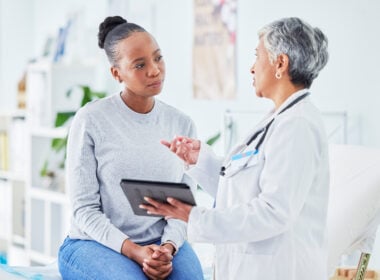

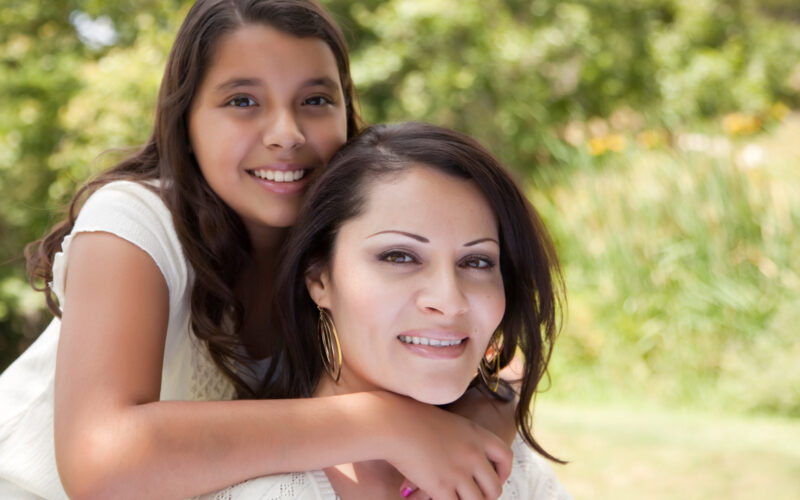

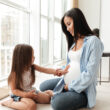

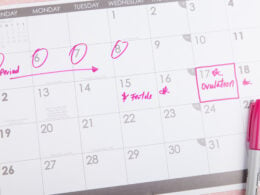
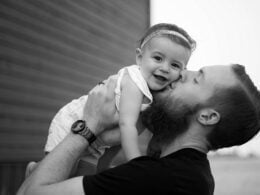

As a natural family planning instructor, I think it can be challenging to communicate to teens a body and health affirming message about fertility that is age appropriate. With my adult students I am very comfortable working with them to help them embrace fertility and childbearing as the natural and intended expression of good reproductive health, but teens sometimes struggle to integrate a fertility positive message. For example, a few years ago a young woman interviewed me for a paper she was writing for her senior marriage and family class. I could tell she was really smart (straight As, class president, varsity athlete) and I invited her to take my class. She had difficulty learning to chart because her low body fat from exercise was interfering with her cycle, so I included her in a class for women trying to conceive so we could work on her cycle. She did fertility yoga with guided visualization, twice daily prayer for fertility, and took Shatavari herb and Turkish honey. After three months her color had improved, her breasts had filled out, her mood had greatly improved, and she had a normal healthy cycle with abundant egg white cervical mucus. She was unprepared for the sudden and intense surge in her libido combined with a serious case of baby fever. The next month she lost her virginity and conceived her first child. Her body was ready to carry to term a healthy child, and she was sooo cute when her baby bump arrived, but still I regret that in my view she acted impulsively because she was not ready mentally and emotionally for what she learned in my class.
It is quite common to have a very strong surge in libido when a regular cycle returns after long term amenorrhea. I’m not familiar with Turkish honey, but Shatavari is a very, very potent aphrodisiac! I have had patients even in their 40s show symptoms of hypersexuality on Shatavari. And I have seen fertility yoga cause a surge in desire, too. I can only imagine how intense her need was as a healthy young woman with the combination of resuming ovulating plus the Shatavari plus the exercises, and being unaccustomed to experiencing and having to control her desire. I understand you were trying to restore her cycle, but goodness gracious she might as well have been a cat in heat with the hormonal surge you prompted with this combination of therapies. Poor girl, she was probably climbing the walls with need!